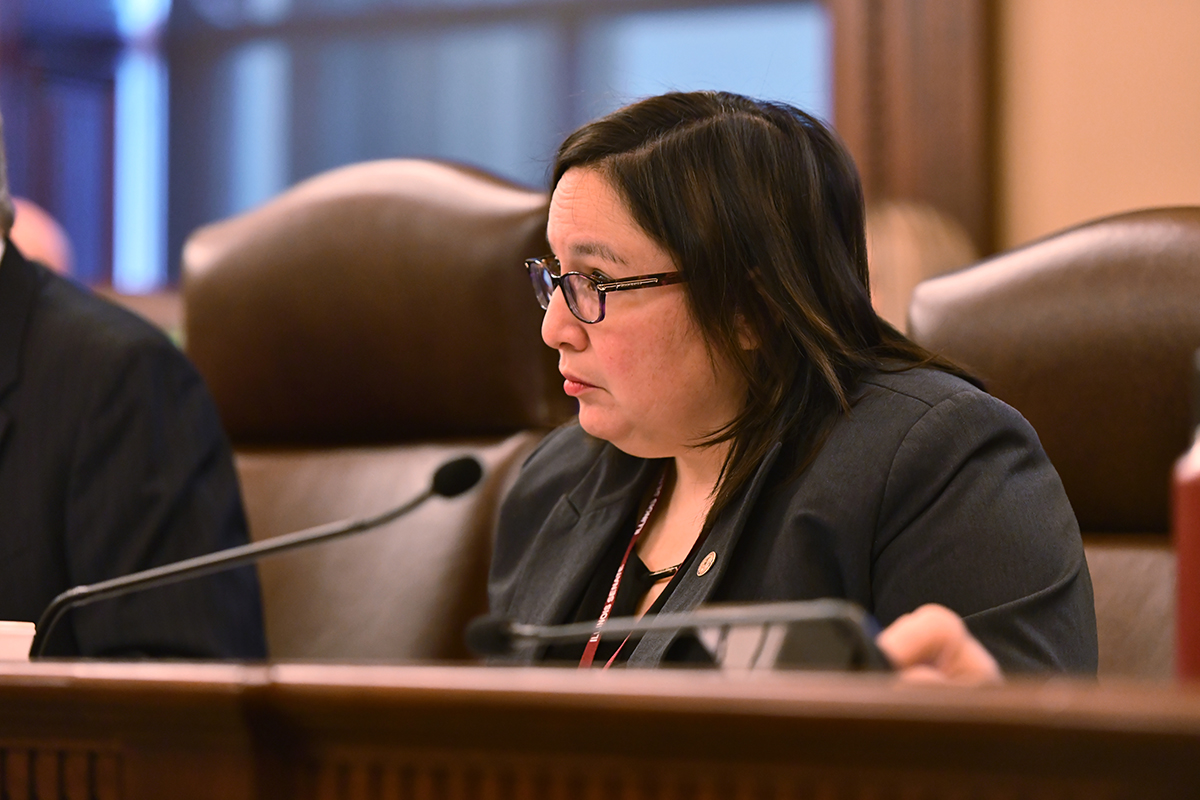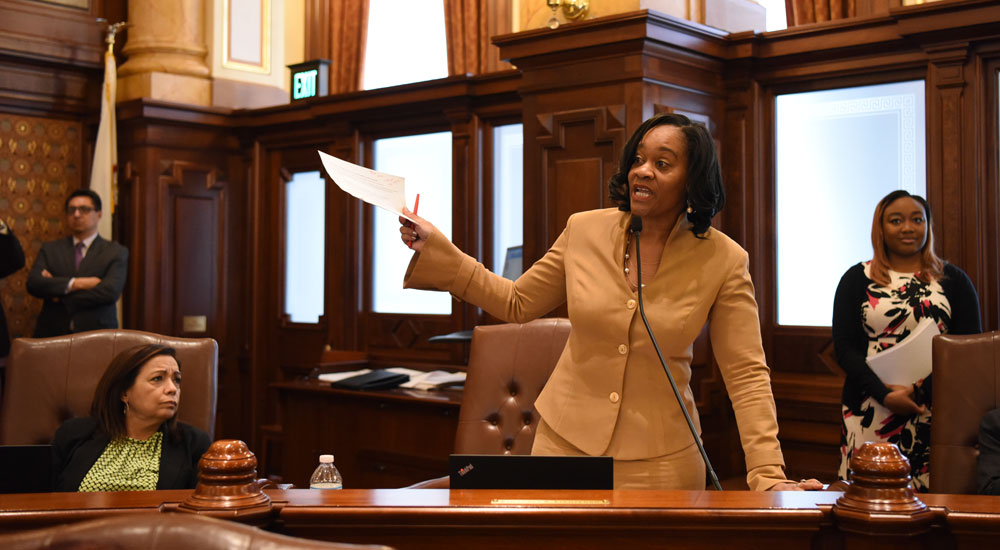- Details
- Category: Senator Cristina Castro News
 ELGIN – After being closed for nearly three months out of health and safety concerns amid the COVID-19 pandemic, State Senator Cristina Castro (D-Elgin) announced plans to reopen her district office July 6, with a few restrictions.
ELGIN – After being closed for nearly three months out of health and safety concerns amid the COVID-19 pandemic, State Senator Cristina Castro (D-Elgin) announced plans to reopen her district office July 6, with a few restrictions.
“The pandemic has put a lot of things on hold, but one thing it hasn’t is the need for people in my district to seek the sort of help that our office is uniquely able to provide,” Castro said. “With all areas of the state having moved into Phase 4 of the Restore Illinois plan, I believe that now is the time we can safely reopen and start providing constituent services face-to-face.”
Castro’s district office is located at 164 Division Street, Suite 102 at The Professional Building in Elgin. The office will be open for its normal business hours, 9 a.m. until 4 p.m. from Monday to Friday. Meetings, however, will be allowed by appointment only. Visitors will be required to wear masks at all times, and social distancing must be maintained for the duration of the meetings. Castro’s satellite office in Hanover Park will remain closed.
“Above all else, our top concern remains the health and safety of everyone while we ride out the coronavirus storm together,” Castro said.
To request an appointment, please send a message or call 847-214-8864.
- Details
- Category: Majority Report

Castro protects more Illinois workers with Human Rights Act expansion
ELGIN — More workers in Illinois will have protections under the state’s Human Rights Act as a law sponsored by State Senator Cristina Castro took effect July 1.
“Workplace discrimination exists. It may not be done with bad intent, and at times it might not even be done intentionally, but it still happens, and real Illinois families are affected by it,” Castro said. “Everyone deserves the right to work at their job without having to worry about being discriminated against just because of who they are.”

Lightford celebrates July 1 minimum wage increase
CHICAGO — Senate Majority Leader Kimberly A. Lightford (D-Maywood) celebrated the July 1 increase to the state’s minimum wage, believing it will help working families navigate the difficulties of the COVID-19 pandemic.
“So many families are struggling right now,” Lightford said. “Though minimum wage workers may count themselves lucky to have jobs while a great deal are unemployed, they still deserve to make a living wage. This increase takes them closer to that goal.”

Middle schools to teach civics under new law by Collins
CHICAGO — Middle school students will be required to study civics as part of their course work under a new law passed by State Senator Jacqueline Y. Collins (D-Chicago) that took effect last week.
“Current events teach us the importance and impact of civic engagement at every age,” Collins said. “In the malicious action and shameful inaction of our current president, we are given daily reminders that to be a society ruled by laws, not men, we must be vigilant and active. That starts with education about our system of government and our own responsibility to it.”

In case you missed it
MEMBERS IN THE NEWS
Senator Christopher Belt, Centreville: Illinois lawmakers will consider police reform, but defunding isn't on the agenda | The Pantagraph
Senator Jennifer Bertino-Tarrant, Shorewood: Measure gives Will County Board toll rate authority | The Times Weekly
Senator Laura Ellman, Naperville: Naperville ranks No. 1 in the nation in census response rate among cities of 140,000 or more | Chicago Tribune
Copyright 2020 - Illinois Senate Democratic Caucus - All Rights Reserved
- Details
- Category: Senator Melinda Bush News
 GRAYSLAKE — In an effort to help people focus on their finances after months of economic disparities caused by the COVID-19 pandemic, State Senator Melinda Bush (Grayslake) is highlighting a number of free credit reporting websites.
GRAYSLAKE — In an effort to help people focus on their finances after months of economic disparities caused by the COVID-19 pandemic, State Senator Melinda Bush (Grayslake) is highlighting a number of free credit reporting websites.
“The COVID-19 pandemic put unforeseen financial burdens on many families,” Bush said. “Credit reporting websites can be expensive, but it’s important to know your credit score. However, there are many free resources available, and I encourage people to take advantage of them.”
As Illinoisans across the state have experienced negative economic impacts during the COVID-19 pandemic, Bush is encouraging everyone to check their credit scores and be aware of their finances. Everyone is now eligible to receive their weekly credit report for free through Equifax, Experian and TransUnion until April 2021. For more information, please visit www.AnnualCreditReport.com.
“Regularly checking your credit can allow you to take control over your finances and lead you to financial freedom,” Bush said. “As we continue to live through these hard and unprecedented times, the best thing we can do is make sure we come out of it stronger.”
- Details
- Category: Senator Jennifer Bertino-Tarrant News
 PLAINFIELD — To help businesses affected by the COVID-19 pandemic through the process of applying for state and federal emergency assistance programs, a new Small Business Development Center opened at the Joliet Junior College, Senator Jennifer Bertino-Tarrant (D-Plainfield) announced Thursday.
PLAINFIELD — To help businesses affected by the COVID-19 pandemic through the process of applying for state and federal emergency assistance programs, a new Small Business Development Center opened at the Joliet Junior College, Senator Jennifer Bertino-Tarrant (D-Plainfield) announced Thursday.
“Businesses across the state have experienced unprecedented financial challenges during the pandemic,” Bertino-Tarrant said. “Many hardworking business owners are still learning how to bounce back, and the centers will provide them with the help and support they need.”
Following months of business losses during the public health crisis, seven new Small Business Development Centers were created across the state to support small businesses during the reopening process.
The Joliet-based center, along with all new and existing centers across the state, will be available to help support businesses with applications for the newest relief programs introduced by the state — known as the Business Interruption Grants Program and the Rebuild Distressed Communities programs.
For more information on the Joliet center and others throughout the state, people can click here.
- Details
- Category: Senator Robert Martwick News
 CHICAGO – State Senator Robert Martwick (D-Chicago) celebrated the new law enabling a Chicago casino, because millions in taxes collected from the casino will be used to bolster the city’s police and fire pension funds.
CHICAGO – State Senator Robert Martwick (D-Chicago) celebrated the new law enabling a Chicago casino, because millions in taxes collected from the casino will be used to bolster the city’s police and fire pension funds.
“The city’s retired firefighters and police have earned their retirements and paid their fair share,” Martwick said. “The casino will help ensure the city can keep its promises to these public servants.”
Senate Bill 516 makes various changes to the state’s gaming laws and will enable Chicago to open its long-sought casino. When fully operational, the casino is expected to provide more than $200 million dollars a year to Chicago’s police and fire pension funds. The taxes collected by the city on all slot machines and table games in the new casino will go exclusively to Chicago’s police and fire pensions.
Martwick traveled to Springfield during the brief legislative session, in spite of major health concerns, in part to help ensure that the casino legislation passed.
“This casino is vital to our regional economy,” Martwick said. “Chicago is already a tourist hub, but a casino will create even more reason for people from neighboring states and from across the world to visit. It will also create hundreds of jobs, another boost for the city and its people.”
The measure passed both the Senate and House with comfortable, bipartisan majorities and takes effect immediately.
- Details
- Category: Senator Patrick Joyce News
 PARK FOREST – The Braceville Fire Protection District will receive more than $20,000 in state grants for new equipment, State Senator Patrick Joyce (D-Park Forest) announced Wednesday.
PARK FOREST – The Braceville Fire Protection District will receive more than $20,000 in state grants for new equipment, State Senator Patrick Joyce (D-Park Forest) announced Wednesday.
“Because of the pandemic, many local fire departments were unable to hold fundraisers to make money for equipment,” Joyce said. “These grants will help departments purchase lifesaving equipment, so they can quickly respond to emergencies in our community.”
Braceville Fire Protection District has been awarded $21,690.
The Office of the Illinois State Fire Marshal awarded the grant to give Illinois first responders the opportunity to replace or upgrade aging equipment they may otherwise not be able to purchase.
The program is an innovative approach to a problem that has long caused difficulties for fire departments and not-for-profit ambulance services in the state, particularly those that struggle to generate the necessary revenue for small equipment, such as air-packs and portable radios.
In total, the Office of the Illinois State Fire Marshal awarded $3.5 million in grants to 154 fire departments, fire districts and EMS providers. A complete list of grant recipients can be found here.
- Details
- Category: Senator Elgie R. Sims Jr. News
 CHICAGO—The minimum wage in Illinois increased to $10 on Wednesday because of a 2019 law co-sponsored by State Senator Elgie R. Sims Jr. (D-Chicago).
CHICAGO—The minimum wage in Illinois increased to $10 on Wednesday because of a 2019 law co-sponsored by State Senator Elgie R. Sims Jr. (D-Chicago).
“We are seeing many years' worth of efforts to help working families finally come to fruition,” Sims said. “I take pride in our work here in Illinois to provide a wage that matches the rising cost of a family’s basic needs.”
The state’s minimum wage increases to $10 per hour July 1, the second in a series of increases required by the law passed last year. That legislation requires the wage to increase by $1 on Jan. 1 of each year going forward until it reaches $15 per hour in 2025.
Sims also disagreed with business leaders who have sought to delay or repeal the law because of the pandemic and its associated economic downturn.
“Those earning minimum wage haven’t seen an increase since 2010,” Sims said. “I understand that this is a difficult time for businesses, but we cannot continue to make working families wait for a pay raise. This is already long overdue.”
The law raises the minimum wage statewide, though some communities, including Cook County and Chicago, have set higher local minimum wages – measures which Sims supports.
- Details
- Category: Senator Jacqueline Y. Collins News
 CHICAGO – Middle school students will be required to study civics as part of their course work under a new law passed by State Senator Jacqueline Collins that takes effect today.
CHICAGO – Middle school students will be required to study civics as part of their course work under a new law passed by State Senator Jacqueline Collins that takes effect today.
“Current events teach us the importance and impact of civic engagement at every age,” Collins said. “In the malicious action and shameful inaction of our current president, we are given daily reminders that to be a society ruled by laws, not men, we must be vigilant and active. That starts with education about our system of government and our own responsibility to it.”
Read more: Middle schools to teach civics under new law by Collins
More Articles …
Page 666 of 768













 © 2026 Illinois Senate Democratic Caucus
© 2026 Illinois Senate Democratic Caucus